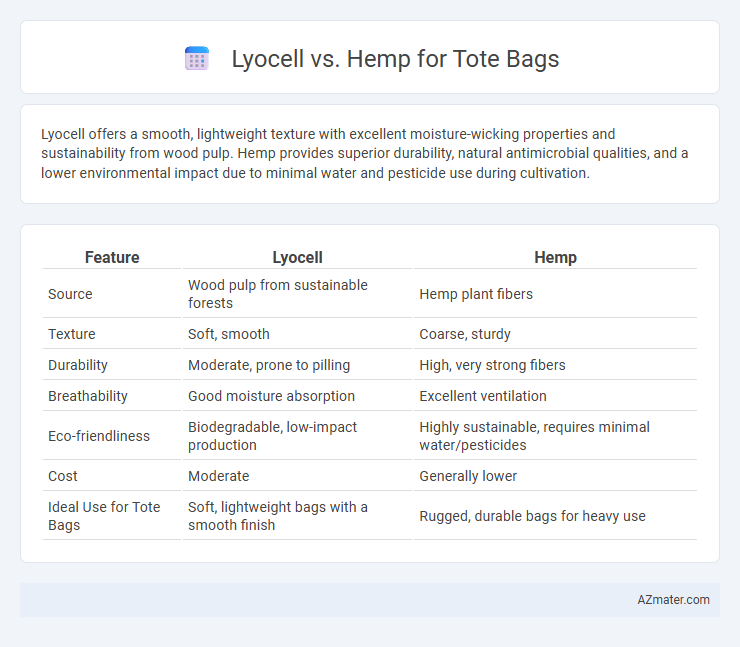Lyocell offers a smooth, lightweight texture with excellent moisture-wicking properties and sustainability from wood pulp. Hemp provides superior durability, natural antimicrobial qualities, and a lower environmental impact due to minimal water and pesticide use during cultivation.
Table of Comparison
| Feature | Lyocell | Hemp |
|---|---|---|
| Source | Wood pulp from sustainable forests | Hemp plant fibers |
| Texture | Soft, smooth | Coarse, sturdy |
| Durability | Moderate, prone to pilling | High, very strong fibers |
| Breathability | Good moisture absorption | Excellent ventilation |
| Eco-friendliness | Biodegradable, low-impact production | Highly sustainable, requires minimal water/pesticides |
| Cost | Moderate | Generally lower |
| Ideal Use for Tote Bags | Soft, lightweight bags with a smooth finish | Rugged, durable bags for heavy use |
Introduction to Lyocell and Hemp Fabrics
Lyocell is a sustainable fabric made from wood pulp, known for its softness, breathability, and moisture-wicking properties, making it ideal for eco-friendly tote bags. Hemp fabric, derived from the fibers of the hemp plant, is highly durable, naturally resistant to bacteria and UV light, and requires minimal water and pesticides during cultivation. Both materials offer environmentally friendly alternatives to traditional cotton, with Lyocell providing a silky texture and Hemp delivering strong, long-lasting tote bags.
Environmental Impact: Lyocell vs Hemp
Hemp and lyocell both offer eco-friendly alternatives for tote bags, with hemp requiring minimal pesticides and thriving on less water, resulting in low environmental footprints. Lyocell is produced from sustainably sourced wood pulp through a closed-loop process that recycles chemicals and reduces waste, contributing to reduced pollution. While hemp grows faster and improves soil health, lyocell's biodegradable properties and responsible production methods make it a competitive choice for sustainable bag manufacturing.
Durability and Strength Comparison
Lyocell tote bags exhibit moderate durability with resistance to tearing and abrasion, making them suitable for everyday use but less ideal for carrying heavy loads. Hemp tote bags stand out for superior strength and longevity, boasting natural fibers that withstand substantial weight and frequent wear without significant degradation. When prioritizing durability and strength, hemp is the more robust choice for tote bags designed to handle heavy or prolonged use.
Comfort and Feel of Lyocell and Hemp Tote Bags
Lyocell tote bags offer an exceptionally smooth and soft texture, providing a comfortable, lightweight feel that is gentle against the skin. Hemp tote bags are naturally coarse and sturdy, delivering a durable, rugged texture that may feel rougher but increases longevity and structural integrity. While lyocell excels in comfort and a luxurious touch, hemp stands out for its robust feel and eco-friendly resilience.
Moisture Wicking and Breathability
Lyocell fibers exhibit excellent moisture-wicking properties, drawing sweat away from the skin and enhancing comfort in tote bags. Hemp fabric offers superior breathability due to its naturally porous structure, promoting airflow and reducing heat retention. Combining Lyocell's moisture management with hemp's ventilation results in a highly functional and comfortable tote bag material.
Style and Aesthetics: Lyocell vs Hemp Totes
Lyocell tote bags offer a smooth, silky texture with a subtle sheen, contributing to a sleek, modern aesthetic ideal for urban or minimalist styles. Hemp totes present a coarse, natural fiber look with a matte finish that appeals to eco-conscious consumers seeking rustic or bohemian charm. Both materials provide durable, stylish options, but Lyocell emphasizes softness and elegance while hemp highlights earthy, organic visuals.
Maintenance and Care Requirements
Lyocell tote bags demand gentle washing with mild detergent and air drying to maintain fiber strength and prevent shrinkage, making them low maintenance but requiring careful handling. Hemp tote bags are highly durable, easily machine washable, and less prone to wear and tear, offering superior long-term maintenance with minimal care. Both fibers are eco-friendly, but hemp's natural resistance to mold and UV light provides added durability for tote bags needing frequent use.
Cost Analysis: Lyocell vs Hemp Tote Bags
Lyocell tote bags typically cost more than hemp due to the advanced closed-loop production process used to create the soft, sustainable fiber from wood pulp, which increases manufacturing expenses. Hemp tote bags offer a more economical option, with lower raw material and cultivation costs, as hemp grows quickly with minimal pesticide use and less water. When balancing cost and eco-friendliness, hemp tote bags provide a budget-friendly sustainable alternative, while lyocell bags appeal to consumers seeking premium softness and durability despite the higher price.
Sustainability and Ethical Considerations
Lyocell and hemp are both sustainable materials for tote bags, with Lyocell derived from eucalyptus wood through a closed-loop process that minimizes chemical waste and water usage. Hemp cultivation requires little water, no pesticides, and improves soil health, making it highly eco-friendly and biodegradable. Ethical considerations favor hemp for its durability and low environmental footprint, while Lyocell's manufacturing relies on responsible forestry and energy-efficient production to maintain sustainability credentials.
Which Fabric is Best for Your Tote Bag?
Lyocell offers a smooth, soft texture with moisture-wicking and biodegradable properties, making it ideal for lightweight, eco-friendly tote bags. Hemp is highly durable, naturally antimicrobial, and resistant to UV light, ensuring long-lasting tote bags that withstand heavy use. Choosing between Lyocell and hemp depends on whether softness and sustainability or strength and longevity are the top priorities for your tote bag.

Infographic: Lyocell vs Hemp for Tote Bag
 azmater.com
azmater.com